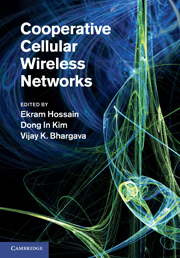Book contents
- Frontmatter
- Contents
- List of contributors
- Preface
- Part I Introduction
- Part II Cooperative base station techniques
- Part III Relay-based cooperative cellular wireless networks
- 6 Distributed space-time block codes
- 7 Collaborative relaying in downlink cellular systems
- 8 Radio resource optimization in cooperative cellular wireless networks
- 9 Adaptive resource allocation in cooperative cellular networks
- 10 Cross-layer scheduling design for cooperative wireless two-way relay networks
- 11 Green communications in cellular networks with fixed relay nodes
- 12 Network coding in relay-based networks
- Part IV Game theoretic models for cooperative cellular wireless networks
- Part V Standardization activities
- Index
8 - Radio resource optimization in cooperative cellular wireless networks
from Part III - Relay-based cooperative cellular wireless networks
Published online by Cambridge University Press: 03 May 2011
- Frontmatter
- Contents
- List of contributors
- Preface
- Part I Introduction
- Part II Cooperative base station techniques
- Part III Relay-based cooperative cellular wireless networks
- 6 Distributed space-time block codes
- 7 Collaborative relaying in downlink cellular systems
- 8 Radio resource optimization in cooperative cellular wireless networks
- 9 Adaptive resource allocation in cooperative cellular networks
- 10 Cross-layer scheduling design for cooperative wireless two-way relay networks
- 11 Green communications in cellular networks with fixed relay nodes
- 12 Network coding in relay-based networks
- Part IV Game theoretic models for cooperative cellular wireless networks
- Part V Standardization activities
- Index
Summary
Introduction
Wireless cellular networks have to be designed and deployed with unavoidable constraints on the limited radio resources such as bandwidth and transmit power. With the boom in the number of new users and the introduction of new wireless cellular services that require a large bandwidth or data rate, the demand for these resources, however, is rising exponentially. Finding a solution to meet this increasing demand with the available resources is a challenging research problem. The primary objective of such research is to find solutions that can improve the capacity and utilization of the radio resources that are available to the service providers. Based on the concept of relay channels, cooperative communication has been found to greatly enhance the performance of a resource-constrained wireless network. It can achieve benefits similar to those of the multipleinput multiple-output (MIMO) system without the need for multiple antennas at each node. By allowing users to cooperate and relay each other's messages to the destination, cooperative communication also improves the transmission quality. Because of the limited power and bandwidth resources of the cellular networks and the multipath fading nature of the wireless channels, the idea of cooperation is particularly attractive for wireless cellular networks.
Proposed cooperative schemes or strategies, such as decode-and-forward (DF), amplify-and-forward (AF), and coded cooperation, usually involve two steps of operation.
- Type
- Chapter
- Information
- Cooperative Cellular Wireless Networks , pp. 205 - 232Publisher: Cambridge University PressPrint publication year: 2011
- 2
- Cited by



